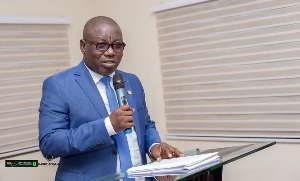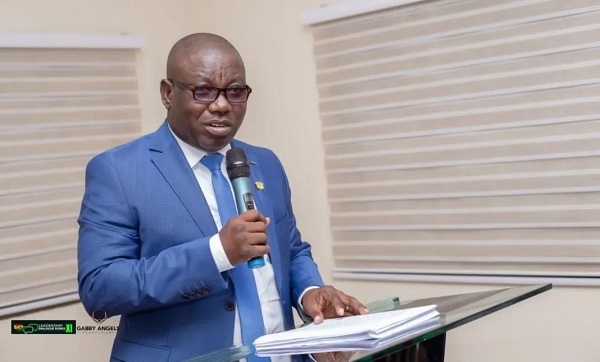 Isaac Adongo, Member of Parliament for Bolgatanga Central
Isaac Adongo, Member of Parliament for Bolgatanga Central
Chairman of Parliament’s Finance Committee, Isaac Adongo, has criticised the opposition New Patriotic Party (NPP) for attempting to attribute Ghana’s current economic stability to policies enacted during their time in office.
Adongo, who also serves as the Member of Parliament for Bolgatanga Central, rejected the NPP’s narrative and instead credited the recent macroeconomic improvements to what he described as President John Dramani Mahama’s “reset agenda” and the “prudent fiscal management” introduced since taking office in January 2025.
He took particular aim at former finance minister Dr Mohammed Amin Adam and Vice President Dr Mahamudu Bawumia, who have suggested that the cedi’s stabilisation is the result of gold reserves accumulated under their administration.
“If reserves alone could stabilise the cedi, why was it hovering around GH¢17 to the dollar in 2024 under their watch, when they had those same reserves?” Adongo questioned, casting doubt on the credibility of the NPP’s claims.
He described the NPP’s shift from blaming external factors for economic difficulties to now claiming credit for the turnaround as “not only dishonest but ignores the economic mismanagement that led us here.”
According to Adongo, the foundation for Ghana’s current macroeconomic stability has been laid by the Mahama administration through a series of deliberate and strategic policy choices.
“These include strong fiscal consolidation, a tightened monetary policy, and key structural reforms,” he stated.
The Finance Committee Chairman pointed to concrete gains such as reduced government borrowing, easing interest rates, and a marked improvement in investor confidence, all of which, he argued, reflect the Mahama administration’s “fiscal credibility.”
“We have moved from opaque, shady borrowing tactics to a regime of transparency and discipline,” Adongo declared.
This transformation, he noted, has “freed up credit for the private sector and reduced the crowding-out effect.”
Adongo also highlighted the recent introduction of a Code of Conduct for government appointees as a major step toward restoring public and investor confidence.
He further emphasised significant improvements in the export sector, especially in gold and cocoa.
He credited these gains to the implementation of the “GoldBod program,” a government initiative aimed at curbing gold smuggling and boosting formal sector production.
“Gold exports are surging not because of old reserves, but because of decisive interventions that have made formal trading more attractive and trustworthy,” he affirmed.
On the monetary front, Adongo praised the Bank of Ghana for enhancing transparency in its foreign exchange operations and policy decisions. These efforts, he said, along with international recognition, have improved Ghana’s standing in global markets.
“S&P’s upgrade of Ghana from ‘SD’ to ‘CCC+’ is no accident. It’s a clear recognition of the Mahama government’s sound economic stewardship,” he stated.
He added that the positive trajectory of the yield curve and easing inflation are not just technical achievements but are beginning to impact everyday life; “These are not just abstract metrics, they are beginning to reflect in real terms in the lives of ordinary Ghanaians, just as President Mahama promised.”
Adongo accused the NPP of consistently avoiding responsibility during economic downturns, only to reappear and claim credit in periods of recovery.
“President Mahama is delivering on his pledge to the Ghanaian people,” Adongo said, “and no amount of revisionist narrative from the NPP will erase their record of haircuts, obnoxious taxes, and economic hardship.”
